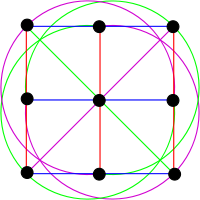
 Oxford Mathematics Professor Peter Keevash has proved the Existence Conjecture for combinatorial designs, answering a question of Steiner from 1853.
Oxford Mathematics Professor Peter Keevash has proved the Existence Conjecture for combinatorial designs, answering a question of Steiner from 1853.
A Steiner Triple System on a set X is a collection T of 3-element subsets of X such that every pair of elements of X is contained in exactly one of the triples in T. An example considered by Plücker in 1835 is the affine plane of order three, which consists of 12 triples on a set of 9 points. Plücker observed that a necessary condition for the existence of a Steiner Triple System on a set with n elements is that n be congruent to 1 or 3 mod 6. In 1846, Kirkman showed that this necessary condition is also sufficient.
In 1853, Steiner posed the natural generalisation of the question: given integers q and r, for which n is it possible to choose a collection Q of q-element subsets of an n-element set X such that any r elements of X are contained in exactly one of the sets in Q? There are some natural necessary divisibility conditions generalising the necessary conditions for Steiner Triple Systems. The Existence Conjecture states that for all but finitely many n these divisibility conditions are also sufficient for the existence of general Steiner systems (and more generally designs).
In his paper Peter proves the Existence Conjecture, and more generally, shows that the natural divisibility conditions are sufficient for clique decompositions of simplicial complexes that satisfy a certain pseudorandomness condition.



